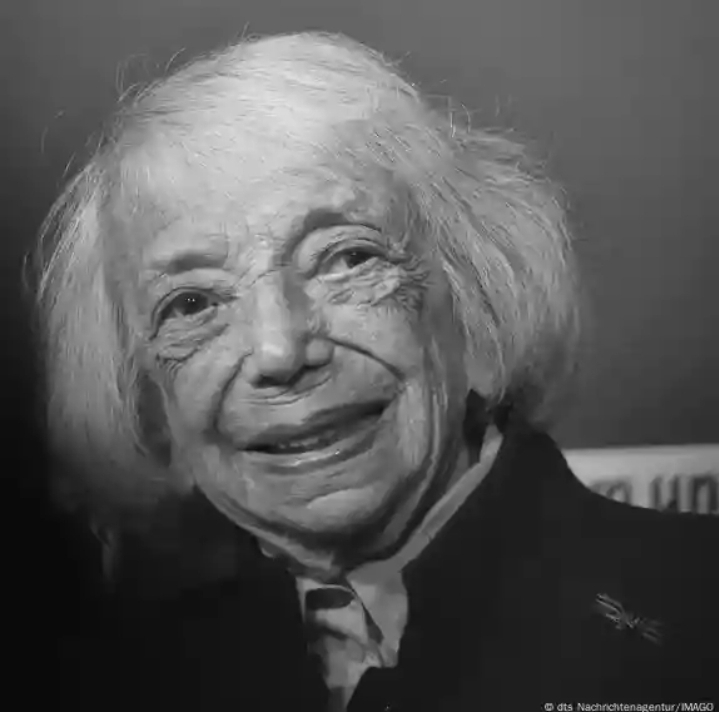Holocaust survivor Margot Friedländer, who spent years promoting remembrance and reconciliation, died at 103 after a life marked by resilience, advocacy, and return to Berlin.
Holocaust Survivor and Advocate Margot Friedländer Dies at 103


Margot Friedländer — a survivor and witness to the Nazi Holocaust and a prominent voice in modern-day Germany — passed away on Friday at the age of 103.
Friedländer spent part of the war years hiding in Berlin before she was taken to the Theresienstadt concentration camp in 1944.
She emigrated to the United States shortly after the end of the war, only moving back to the German capital in 2010, at the age of 88.
Friedländer appeared on the cover of the German Vogue last year.
German President Frank-Walter Steinmeier expressed his condolences, saying that Friedländer "gifted our country reconciliation."
Steinmeier was due to honor Friedländer with a state medal on Friday.
Germany's new Chancellor Friedrich Merz praised Friedländer for speaking up for "peaceful cooperation, against antisemitism, and forgetting."
"She entrusted us with her story. It is our task and our duty to pass it on," Merz said.
After her return to Germany, Friedländer gave numerous speeches and visited many German schools to talk with children and young people.
"I often ask myself if coming back here was the right thing to do," Friedländer said in "A Long Way Home," a 2010 documentary co-produced by DW.
In the same film, she admitted to uncomfortable feelings around some Berliners: "I'm still very guarded about the people of my generation whom I meet here. They were the ones who cheered the Nazis back then. And did nothing to put a stop to what was going on. Everybody knew about it, and they looked away. Although I came back, it's still something that affects me very deeply."
In recent years, Friedländer was awarded many state honors as a prominent voice for remembrance. She also opened the Margot Friedländer Foundation in 2023.
"I was born in Berlin, a true Berliner," Friedländer told DW in a 2023 interview. In 1936, she enrolled at a Berlin arts and crafts school and studied fashion and advertising drawing. She worked as a seamstress and her ambition was to design clothes. Around that time, her parents separated and her father eventually left for Belgium.
Then, the war started.
In her memoir, Friedländer recounts the story of her younger brother, 17 years old, being arrested by the Gestapo and her mother going to report herself to the authorities so she could join him in January 1943. Margot Friedländer — then still Anni Margot Bendheim — was 21 years old at the time. A woman she hardly knew handed her her mother's handbag, containing an address book and an amber necklace. There was also a message passed on verbally: "Try to make your life."
Friedländer made this message the title of her memoir many decades later.
"These words shaped my life," Friedländer told DW. "I feel that I have accomplished something, not just for my mother, not just for six million Jews, but for the many million people who were killed because they didn't want to do what they were told to do."
Friedländer spent 15 months in hiding in Berlin, being protected by non-Jewish Germans. She didn't learn of her family's deaths in Auschwitz until much later. In the spring of 1944, she encountered a patrol of so-called "graspers" — Jews who were forced to track down and extradite other Jews on behalf of the Nazi SS. This led to her own imprisonment in the Theresienstadt concentration camp, where she managed to survive until the fall of the Nazi regime in May 1945. After the liberation, she married a man who was also in the camp, and the two left for the US in 1946.
Her husband died in 1997, without setting foot in Germany again.
Talking to DW, she said that the memories of Germans who helped were a big factor in deciding to go back to Berlin.
"Germans were people, too. They hid me, shared their bed and food with me," she said. "There was people who did not look away, who did something that could have cost them their heads."

 বাংলা
বাংলা  Spanish
Spanish  Arabic
Arabic  French
French  Chinese
Chinese 
